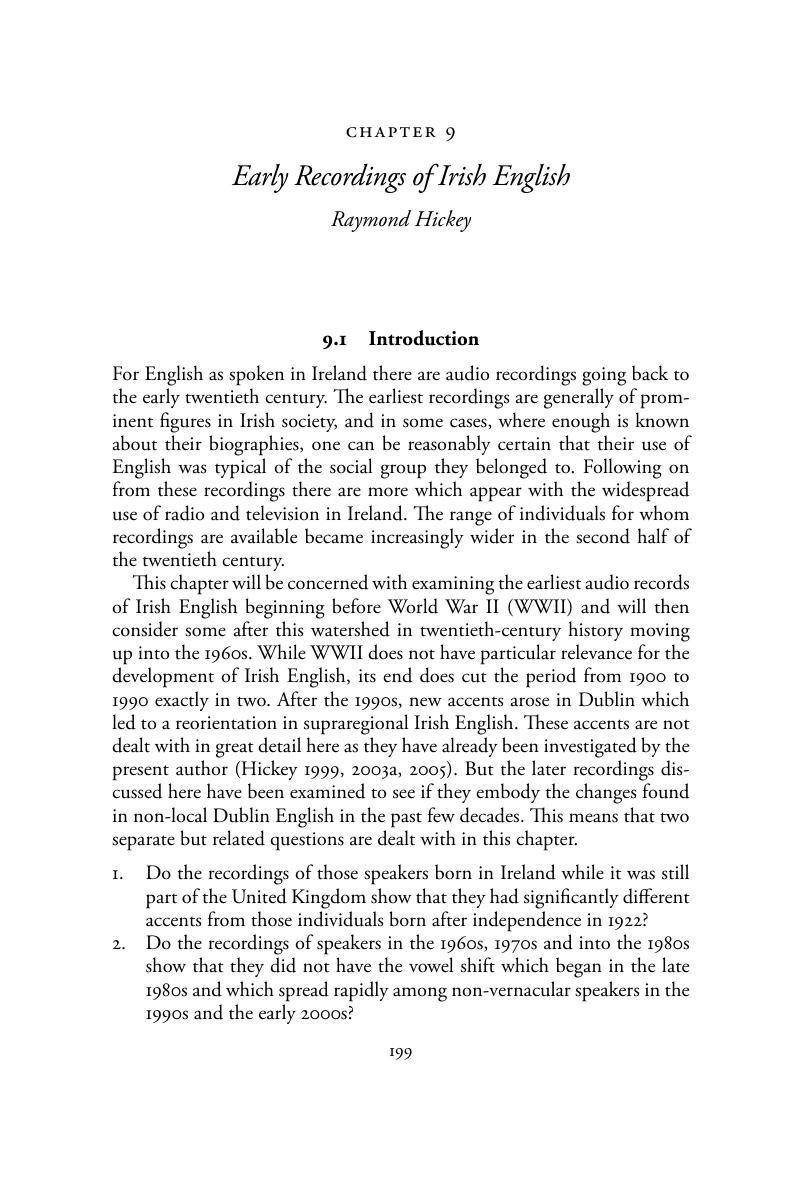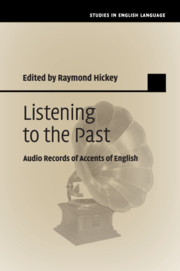Book contents
- Listening to the PastAudio Records of Accents of English
- Studies in English Language
- Listening to the Past
- Copyright page
- Contents
- Figures
- Maps
- Tables
- Contributors
- Preface
- Chapter 1 Analysing Early Audio Recordings
- Chapter 2 British Library Sound Recordings of Vernacular Speech
- Chapter 3 Twentieth-Century Received Pronunciation
- Chapter 4 Twentieth-Century Received Pronunciation
- Chapter 5 London's Cockney in the Twentieth Century
- Chapter 6 The Origins of Liverpool English
- Chapter 7 Tyneside English
- Chapter 8 Scotland
- Chapter 9 Early Recordings of Irish English
- Chapter 10 Evidence of American Regional Dialects in Early Recordings
- Chapter 11 New England
- Chapter 12 Upper Midwestern English
- Chapter 13 Western United States
- Chapter 14 Analysis of the Ex-Slave Recordings
- Chapter 15 Archival Data on Earlier Canadian English
- Chapter 16 Canadian Raising in Newfoundland?
- Chapter 17 The Caribbean
- Chapter 18 Early Recordings from Ghana
- Chapter 19 Earlier South African English
- Chapter 20 Early Twentieth-Century Tristan da Cunha h'English
- Chapter 21 Open Vowels in Historical Australian English
- Chapter 22 Early New Zealand English
- Chapter 23 The Development of Recording Technology
- Index
- References
Chapter 9 - Early Recordings of Irish English
Published online by Cambridge University Press: 21 July 2017
- Listening to the PastAudio Records of Accents of English
- Studies in English Language
- Listening to the Past
- Copyright page
- Contents
- Figures
- Maps
- Tables
- Contributors
- Preface
- Chapter 1 Analysing Early Audio Recordings
- Chapter 2 British Library Sound Recordings of Vernacular Speech
- Chapter 3 Twentieth-Century Received Pronunciation
- Chapter 4 Twentieth-Century Received Pronunciation
- Chapter 5 London's Cockney in the Twentieth Century
- Chapter 6 The Origins of Liverpool English
- Chapter 7 Tyneside English
- Chapter 8 Scotland
- Chapter 9 Early Recordings of Irish English
- Chapter 10 Evidence of American Regional Dialects in Early Recordings
- Chapter 11 New England
- Chapter 12 Upper Midwestern English
- Chapter 13 Western United States
- Chapter 14 Analysis of the Ex-Slave Recordings
- Chapter 15 Archival Data on Earlier Canadian English
- Chapter 16 Canadian Raising in Newfoundland?
- Chapter 17 The Caribbean
- Chapter 18 Early Recordings from Ghana
- Chapter 19 Earlier South African English
- Chapter 20 Early Twentieth-Century Tristan da Cunha h'English
- Chapter 21 Open Vowels in Historical Australian English
- Chapter 22 Early New Zealand English
- Chapter 23 The Development of Recording Technology
- Index
- References
Summary

- Type
- Chapter
- Information
- Listening to the PastAudio Records of Accents of English, pp. 199 - 231Publisher: Cambridge University PressPrint publication year: 2017
References
- 7
- Cited by



